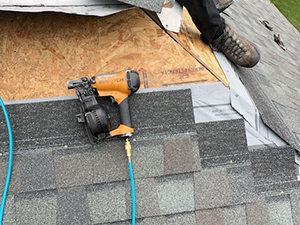A roof is one of the most important elements of any home. It protects your family, your belongings, and your investment. When it comes to installing a new roof or replacing an old one, finding the right residential roofing installer is crucial to ensure the job is done correctly, safely, and within budget. But with so many options available, how do you choose the best contractor for the job?
In this article, we will explore what a residential roofing installer does, how to find a qualified contractor, and what factors to consider when hiring a roofing professional, such as Schrock Roofing in Clinton, Montana. Call us now on 406-961-2990.
What Does a Residential Roofing Installer Do?

A residential roofing installer is a skilled professional who specializes in the installation, repair, and maintenance of roofs on residential properties. Their work involves various tasks, including:
- Assessing roof condition: Before installing or repairing a roof, a roofing installer will evaluate the current condition of the roof deck and the existing roofing materials.
- Installing new roofs: When replacing a roof, a residential roofing installer will carefully remove the old materials and install new roofing systems, whether it is asphalt shingles, metal roofing, tile, or another type of roofing material.
- Repairs and replacements: Roofing installers are also responsible for repairing leaks, replacing damaged shingles or tiles, and addressing structural damage that may compromise the roof’s integrity.
- Roof maintenance: In addition to installation and repairs, roofing installers may offer regular maintenance services to ensure your roof remains in good condition and performs optimally.
- Installing flashing and vents: They also install important components like flashing, which helps prevent water from seeping into joints, and vents that allow for proper airflow within the attic.
How to Choose a Qualified Residential Roofing Installer

Selecting the right roofing installer can be the difference between a successful, long-lasting roof and one that needs repairs soon after installation. Here are key factors to consider when choosing a roofing contractor:
License and Insurance
Always ensure that the roofing installer you hire is licensed and insured. A licensed roofer has passed the necessary tests and is up to date with local building codes and regulations. Insurance is crucial because it protects you from liability if something goes wrong during the installation process.
Experience and Reputation
Look for a roofing installer with experience in the type of roofing material you want. If you are installing an asphalt shingle roof, make sure they have a good track record with that material. Reading online reviews, asking for references, and checking the company’s reputation with the Better Business Bureau (BBB) can help you determine if the contractor is trustworthy and reliable.
Written Estimates
A reputable roofing installer should provide you with a written estimate outlining the project’s scope of work, materials, labor costs, and timeline. This will ensure there are no surprises or hidden fees once the job begins. Be wary of contractors who provide vague or overly low estimates.
Warranty
Ensure that the roofing installer offers a warranty on both their workmanship and the materials used. A good warranty gives you peace of mind and ensures that any issues that arise after installation will be addressed at no extra cost. Most roofing materials come with a manufacturer’s warranty, but a separate warranty on the installation itself is just as important.
Timeliness and Communication
Choose a roofing contractor who communicates clearly and promptly throughout the process. From the initial consultation to the completion of the project, you should be kept informed about progress, timelines, and any potential issues. Timeliness is important as well — ensure that the contractor provides a clear start and end date for the project.
Roofing Materials and Options
A reliable roofing installer will provide you with different material options and explain the pros and cons of each. Whether you want asphalt shingles, metal roofing, clay tiles, or another material, a knowledgeable installer can guide you toward the best choice for your home, budget, and climate.
The Installation Process
When you hire a residential roofing installer, you can expect the following steps during the roof installation process:
Consultation and Estimate: The installer will assess your roof, discuss your preferences, and provide a written estimate.
Removal of Old Roofing: If you are replacing an old roof, the installer will carefully remove the existing roofing materials and inspect the roof deck for damage.
Installation of New Roof: New materials are installed according to manufacturer instructions, ensuring proper sealing, insulation, and ventilation.
Final Inspection: After installation, the roofing installer will inspect the roof for any issues and ensure everything is securely in place.
Expert Residential Roofing Installer
Hiring the right residential roofing installer is essential for ensuring your roof is installed correctly, efficiently, and safely. By choosing a qualified contractor such as our team at Schrock Roofing with experience, a solid reputation, and a commitment to quality, you can be confident that your new roof will protect your home for many years to come. Investing in a reliable roofing installer today will save you time, money, and stress in the future. Call our Clinton, Montana team today at 406-961-2990.
FAQ
What should be included in the roofing estimate?
A roofing estimate should include details on the scope of work, materials to be used, labor costs, estimated timeline, and any additional charges. It is important that the estimate is written, clear, and comprehensive to avoid surprises later.
How do I know when it is time to replace my roof?
Signs that it is time to replace your roof include visible damage (such as cracked or missing shingles), leaks inside your home, water stains on the ceiling, and the age of your roof (typically over 20–25 years for asphalt shingles). If you notice these signs, it is best to contact a roofing professional for an inspection.